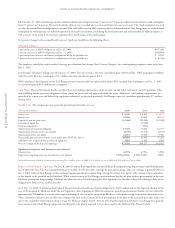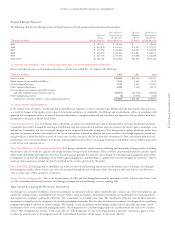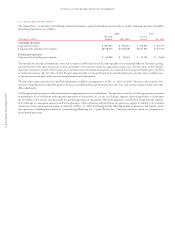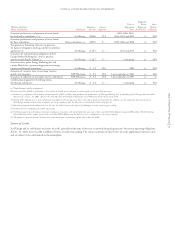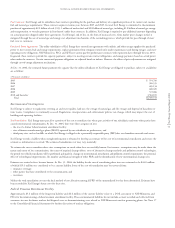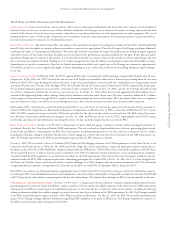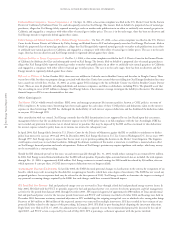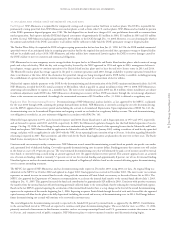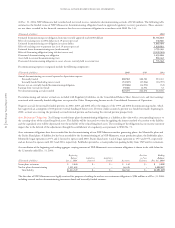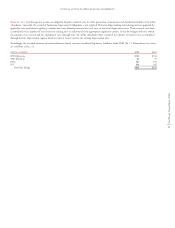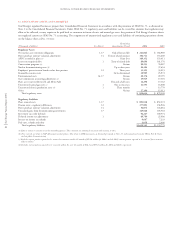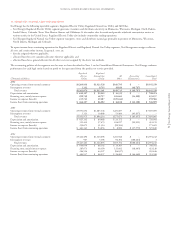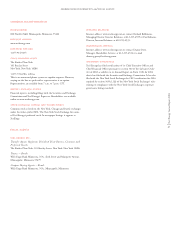Xcel Energy 2004 Annual Report Download - page 80
Download and view the complete annual report
Please find page 80 of the 2004 Xcel Energy annual report below. You can navigate through the pages in the report by either clicking on the pages listed below, or by using the keyword search tool below to find specific information within the annual report.
NOTES to CONSOLIDATED FINANCIAL STATEMENTS
Xcel Energy Annual Report 2004
78
Polychlorinated Biphenyl (PCB) Storage and Disposal In August 2004, SPS received notice from the EPA contending SPS violated PCB storage and
disposal regulations with respect to storage of a drained transformer and related solids. The EPA contends the fine for the alleged violation is approximately
$1.2 million. SPS is contesting the fine and is in discussions with the EPA.
Nuclear Insurance NSP-Minnesota’s public liability for claims resulting from any nuclear incident is limited to $10.8 billion under the 1988 Price-Anderson
amendment to the Atomic Energy Act of 1954. NSP-Minnesota has secured $300 million of coverage for its public liability exposure with a pool of
insurance companies. The remaining $10.5 billion of exposure is funded by the Secondary Financial Protection Program, available from assessments
by the federal government in case of a nuclear accident. NSP-Minnesota is subject to assessments of up to $100.6 million for each of its three licensed
reactors, to be applied for public liability arising from a nuclear incident at any licensed nuclear facility in the United States. The maximum funding
requirement is $10 million per reactor during any one year.
NSP-Minnesota purchases insurance for property damage and site decontamination cleanup costs from Nuclear Electric Insurance Ltd. (NEIL). The
coverage limits are $2.1 billion for each of NSP-Minnesota’s two nuclear plant sites. NEIL also provides business interruption insurance coverage,
including the cost of replacement power obtained during certain prolonged accidental outages of nuclear generating units. Premiums are expensed
over the policy term. All companies insured with NEIL are subject to retroactive premium adjustments if losses exceed accumulated reserve funds.
Capital has been accumulated in the reserve funds of NEIL to the extent that NSP-Minnesota would have no exposure for retroactive premium assessments
in case of a single incident under the business interruption and the property damage insurance coverage. However, in each calendar year, NSP-Minnesota
could be subject to maximum assessments of approximately $6.9 million for business interruption insurance and $26.1 million for property damage
insurance if losses exceed accumulated reserve funds.
Legal Contingencies
In the normal course of business, Xcel Energy is subject to claims and litigation arising from prior and current operations. Xcel Energy is actively
defending these matters and has recorded an estimate of the probable cost of settlement or other disposition. The ultimate outcome of these matters
cannot presently be determined. Accordingly, the ultimate resolution of these matters could have a material adverse effect on Xcel Energy’s financial
position and results of operations.
Bender et al. vs. Xcel Energy On July 2, 2004, five former NRG officers filed a lawsuit against Xcel Energy in the U.S. District Court for the District
of Minnesota. The lawsuit alleges, among other things, that Xcel Energy violated the ERISA by refusing to make certain deferred compensation payments
to the plaintiffs. The complaint also alleges interference with ERISA benefits, breach of contract related to the nonpayment of certain stock options and
unjust enrichment. The complaint alleges damages of approximately $6 million. Xcel Energy believes the suit is without merit. On Jan. 19, 2005, Xcel
Energy filed a motion for summary judgement. A hearing for this motion is scheduled for April 21, 2005.
Carbon Dioxide Emissions Lawsuit On July 21, 2004, the attorneys general of eight states and New York City, as well as several environmental groups,
filed lawsuits in U.S. District Court for the Southern District of New York against five utilities, including Xcel Energy, to force reductions in carbon
dioxide (CO2) emissions. The other utilities include American Electric Power Co., Southern Co., Cinergy Corp. and Tennessee Valley Authority. CO2
is emitted whenever fossil fuel is combusted, such as in automobiles, industrial operations and coal- or gas-fired power plants. The lawsuits allege that
CO2emitted by each company is a public nuisance as defined under state and federal common law because it has contributed to global warming. The
lawsuits do not demand monetary damages. Instead, the lawsuits ask the court to order each utility to cap and reduce its CO2emissions. In October 2004,
Xcel Energy and four other utility companies filed a motion to dismiss the lawsuit, contending, among other reasons, that the lawsuit should be dismissed
because it is an attempt to usurp the policy-setting role of the U.S Congress and the president. The ultimate financial impact of these lawsuits, if any,
is not determinable at this time.
The issue of global climate change is receiving increased attention. Debate continues in the scientific community concerning the extent to which the
earth’s climate is warming, the causes of climate variations that have been observed, and the ultimate impacts that might result from a changing climate.
There also is considerable debate regarding public policy for the approach that the United States should follow to address the issue. The United
Nations-sponsored Kyoto Protocol, which establishes greenhouse gas reduction targets for developed nations, entered into force on Feb. 16, 2005.
President Bush has declared that the United States will not ratify the protocol and is opposed to legislative mandates, preferring a program based on
voluntary efforts and research on new technologies. Xcel Energy is closely monitoring the issue from both scientific and policy perspectives. While it is
not possible to know the eventual outcome, Xcel Energy believes the issue merits close attention and is taking actions it believes are prudent to be best
positioned for a variety of possible future outcomes. Xcel Energy is participating in a voluntary carbon management program and has established goals
to reduce its volume of carbon dioxide emissions by 12 million tons by 2009 and reduce carbon intensity by 7 percent by 2012. In certain jurisdictions,
the evaluation process for future generating resources incorporates the risk of future carbon limits through the use of a carbon cost adder or externality
costs. Xcel Energy also is involved in other projects to improve available methods for managing carbon.
Department of Labor Audit In 2001, Xcel Energy received notice from the Department of Labor (DOL) Employee Benefit Security Administration
that it intended to audit the Xcel Energy pension plan. After multiple on-site meetings and interviews with Xcel Energy personnel, the DOL indicated
on Sept. 18, 2003, that it is prepared to take the position that Xcel Energy, as plan sponsor and through its delegate, the Pension Trust Administration
Committee, breached its fiduciary duties under the ERISA with respect to certain investments made in limited partnerships and hedge funds in 1997
and 1998. The DOL has offered to conclude the audit at this time if Xcel Energy is willing to contribute to the plan the full amount of losses from the
questioned investments, or approximately $7 million. On July 19, 2004, Xcel Energy formally responded with a letter to the DOL that asserted
no fiduciary violations have occurred and extended an offer to meet to discuss the matter further. If the DOL offer is put into effect, the requested
contribution would affect cash flows only and not the net income of Xcel Energy.


